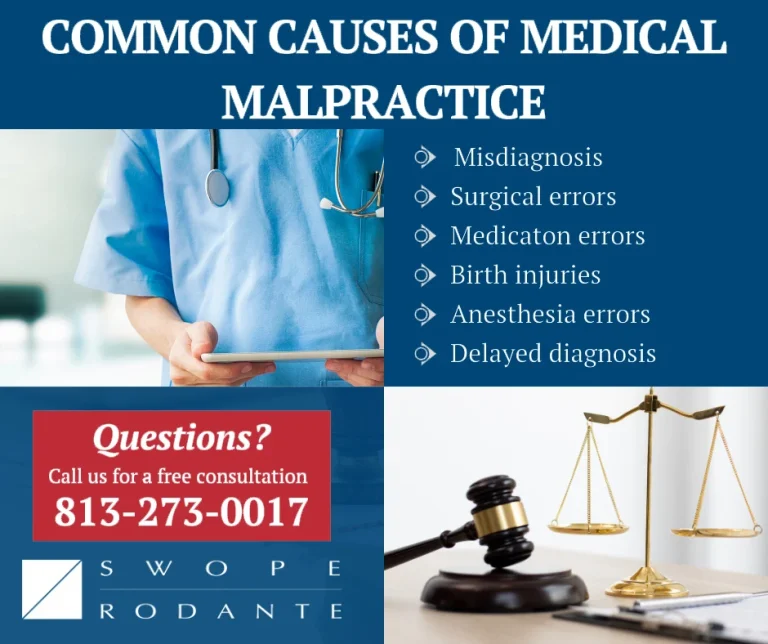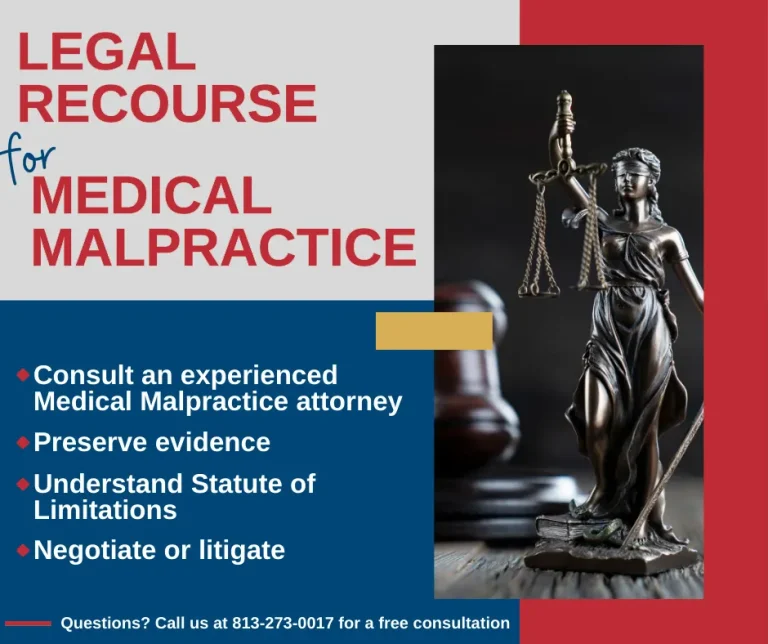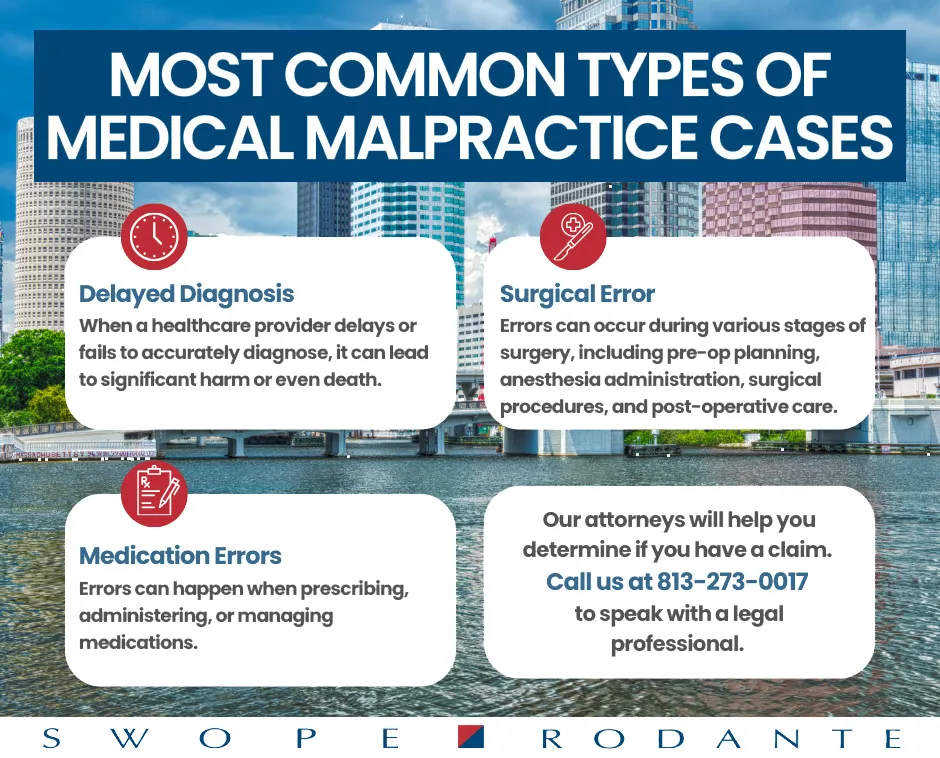
A Tampa medical malpractice attorney knows the oath every doctor must take. First, do no harm. But what happens if this duty is breached? Medical malpractice, also known as medical negligence, may have occurred.
Patients who are injured because of a doctor’s mistake are left with the financial burden of mounting medical bills in addition to their physical and emotional pain. These patients are entitled to compensation for their injuries.
Our attorneys in Tampa, FL will help you determine whether you have a malpractice case. Call (813) 273-0017 for a free consultation with a medical malpractice lawyer at Swope, Rodante P.A.
Medical malpractice occurs when a physician fails to properly treat a medical condition, causing a new injury or worsening an existing medical condition.
Patients may be entitled to compensation for damages such as medical bills and lost wages, including future wages lost due to disability. Noneconomic damages may be awarded for the patient’s emotional trauma and physical pain.
When an injured patient brings a claim, the insurer has a duty of good faith under state statutory law to act in the best interest of the insured, not its own self-interest in settling a claim. If the insurer fails to do this, then the insured may also have a claim for bad faith.
Dale Swope, our firm’s founding partner, co-authored “Bad Faith Claims” in the Florida Medical Malpractice Handbook, 2nd Edition, Florida Bar CLE Manual (2009) with attorneys Shea Moxon and Celene Humphries.
You may think medical malpractice would never happen to you or a loved one. If you have been injured due to medical negligence, our experienced trial attorneys can help determine if you have a lawsuit.
Nationally Recognized Medical Malpractice Attorneys with Trial Expertise
At Swope, Rodante P.A., our legal professionals stand at the forefront of excellence. Their dedication and accomplishments have garnered national recognition, reinforcing our commitment to providing exceptional legal services. The following accolades and leadership roles are just some of the examples that define our commitment to justice:
Super Lawyers: Celebrating Legal Excellence
Our attorneys have earned the prestigious distinction of being recognized by Super Lawyers Magazine. Recently, Dale Swope, Brent Steinberg, Daniel Greene, and Sean Shaw were acknowledged for their exceptional work. This honor places them among the top legal professionals in the nation.
AV Rated by Martindale-Hubbell: A Symbol of Legal Excellence
Partners Dale Swope, Angela Rodante, Brent Steinberg, Daniel Greene, and Attorney Anna Frederiksen all hold the esteemed AV Rating by Martindale-Hubbell. This rating signifies not only legal prowess but also unwavering integrity—a testament to our commitment to excellence.
Best Lawyers & U.S. News “Best Law Firms”: A Decade of Consistent Recognition
Since 2010, we’ve consistently received recognition as one of the “Best Law Firms” by U.S. News and Best Lawyers. This enduring acknowledgment reflects our dedication to providing exceptional legal representation.
Leadership and Advocacy
Our attorneys don’t just excel in the courtroom; they lead and advocate for justice:
- President of the Florida Justice Association: In 2017-18, Dale Swope spearheaded this influential organization, championing fairness and equity.
- Member of the American College of Coverage Counsel: Since 2019, Angela Rodante has been recognized as one of the most prominent members of the insurance law bar.
- Board Certified in Civil Trial Law: Since 1992, The Florida Bar has recognized Dale Swope’s mastery in civil trial matters with a board certification.
- Board Certified in Appellate Practice: Brent Steinberg’s expertise in appellate practice earned him this distinction in 2022, and he continues to maintain this certification.
A Trusted Partner with a Proven Track Record
Beyond these specific achievements, Swope, Rodante P.A. and our lawyers are affiliated with numerous other organizations representing the top lawyers locally and nationally, including the Tampa Bay Trial Lawyers Association, Florida Trend, National Trial Lawyers, and the American Board of Trial Advocates. When you choose us, you’re not just hiring attorneys; you’re gaining a trusted partner with a legacy of success.
Tampa Medical Malpractice Client Review
“Dale and Angela, along with the rest of their team, did an awesome job with our case. They worked seamlessly with our other legal team that got us to this point. Then, collaborating with our existing team, they brought our case to a complete satisfaction. We are grateful!”
– Michael Thornal, Google Review
What is Medical Malpractice?
Medical malpractice refers to negligence or professional misconduct by a healthcare provider that results in substandard treatment and causes harm or injury to a patient (Mello et al., 2010). Reference: The New England Journal of Medicine
Malpractice is a serious concern in Tampa, Florida, that can have devastating consequences for patients. If you believe you or a loved one has been a victim of medical malpractice in Tampa, contact a medical malpractice attorney as soon as possible.
Here, we will delve into the definition of medical malpractice, common causes specific to Tampa, potential implications, and the legal recourse available to medical malpractice victims in Tampa and throughout Florida.
Common Causes of Medical Malpractice in Tampa, FL

In Tampa, a variety of incidents can lead to a medical malpractice claim. Including:
- Misdiagnosis or delayed diagnosis: Failure to accurately diagnose a medical condition or delayed diagnosis can result in significant harm to a patient in the Tampa area. This can lead to delayed or inappropriate treatment, worsening the patient’s condition.
- Surgical errors: Mistakes during surgery, such as wrong-site surgery, leaving surgical instruments inside the patient, or operating on the wrong patient, are serious instances of medical malpractice specific to Tampa.
- Medication errors: Administering incorrect dosages, prescribing the wrong medication, or failing to account for potential drug interactions can have severe consequences for patients in Tampa.
- Birth injuries: Malpractice can occur during childbirth in Tampa, leading to birth injuries such as cerebral palsy, brachial plexus injuries, or maternal injuries.
- Anesthesia errors: Errors in administering anesthesia can result in complications or even fatalities during surgical procedures in Tampa.
Implications of Medical Malpractice in Tampa
Victims of malpractice in Tampa may suffer physical, emotional, and financial consequences. These can include:
- Physical harm: Patients in Tampa may experience worsened medical conditions, new injuries, or even permanent disabilities due to medical negligence.
- Emotional distress: Medical malpractice incidents can lead to emotional trauma, anxiety, depression, and a loss of trust in healthcare providers among patients in Tampa.
- Financial burdens: Victims in Tampa often face mounting medical bills, ongoing treatment costs, lost wages due to disability or prolonged recovery, and other financial hardships.
Legal Recourse for Medical Malpractice in Florida
 If you believe you have been a victim of medical malpractice in Tampa, it’s essential to seek legal representation from experienced attorneys familiar with the local laws and regulations. Here are some steps to consider:
If you believe you have been a victim of medical malpractice in Tampa, it’s essential to seek legal representation from experienced attorneys familiar with the local laws and regulations. Here are some steps to consider:
- Consult an experienced Med Mal attorney in Tampa: A skilled attorney specializing in medical malpractice in Tampa can evaluate your case, gather evidence specific to Tampa, and guide you through the local legal process.
- Preserve evidence: Document and gather any relevant medical records, test results, photographs, and witness statements specific to your case in Tampa to support your claim.
- Understand the statute of limitations in Tampa: Florida has specific time limits for filing medical malpractice lawsuits, so it’s crucial to be aware of and adhere to these deadlines in Tampa.
- Determine the damages: Your attorney in Tampa will help assess the damages you’ve suffered, including medical expenses, lost wages, pain and suffering, and future care needs, taking into account local factors.
- Negotiate or litigate: Depending on the circumstances in Tampa, your attorney will work to negotiate a fair settlement with the responsible parties or proceed to litigation if necessary, while considering the local legal landscape.
Medical Malpractice Statistics
“Medical mistakes kill enough people each week to fill four jumbo jets,” according to an article in the Wall Street Journal by Dr. Marty Makary, a surgeon at Johns Hopkins Hospital and developer of surgical check lists adopted by the World Health Organization. Checklists may help prevent doctors and medical providers from committing medical malpractice and avoiding a medical malpractice lawsuit.
Diagnostic errors, including delayed, incorrect, and missed diagnoses, account for more lawsuits than any other medical error, the Journal of Family Practice’s September 2010 issue reported.
Over a decade ago, a landmark report published by the Institute of Medicine, entitled “To Err is Human: Building a Safer Health System,” suggested that as many as 98,000 people die each year in the U.S. as a result of medical errors – making this type of accident the eighth leading cause of death. Among hospitalized Medicare patients from 2007-2009, a HealthGrades, Inc. report found 79,670 potentially preventable deaths. A medical malpractice lawyer is often left explaining to families how such medical negligence could occur when their loved one is no longer with them.
Here are some other important statistics related to medical malpractice cases:
- Frequency of Medical Malpractice Claims: The frequency of claims varies, but studies have shown that they are relatively rare. According to a study published in the New England Journal of Medicine, about 1% of hospital patients experience a medical injury due to negligence, and only a fraction of those injured patients file malpractice claims. Source: https://www.nejm.org/doi/full/10.1056/nejm199102073240604
- Leading Causes of Medical Malpractice Claims: Several factors can contribute to these claims. Some common causes include misdiagnosis or delayed diagnosis, surgical errors, medication errors, birth injuries, anesthesia errors, and communication failures between healthcare providers. Source: https://www.ncbi.nlm.nih.gov/books/NBK499956/
- Impact of Medical Malpractice: Malpractice can have severe consequences for patients. According to a study by the Institute of Medicine, medical errors contribute to between 44,000 and 98,000 deaths annually in the United States. Malpractice can also lead to long-term injuries, disabilities, emotional distress, and financial burdens for the affected individuals and their families. Source: https://pubmed.ncbi.nlm.nih.gov/25077248/
- Settlements and Verdicts: The outcomes of medical malpractice cases can vary. Some cases result in settlements, where the parties involved reach a financial agreement outside of court. Others proceed to trial, and the jury or judge decides the verdict. The compensation awarded in malpractice cases can range from thousands to millions of dollars, depending on the severity of the harm caused. While the range of recovery varies greatly depending on the case, the average award, according to Forbes, was $679,000. Source: https://www.forbes.com/advisor/legal/personal-injury/personal-injury-settlement-amounts/
- Physician Specialty and Medical Malpractice Claims: Certain medical specialties are more prone to malpractice claims than others. High-risk specialties include neurosurgery, thoracic-cardiovascular surgery, orthopedic surgery, obstetrics and gynecology, and general surgery. These specialties often involve complex procedures and carry a higher risk of adverse outcomes. Source: https://www.ncbi.nlm.nih.gov/pmc/articles/PMC3204310/
- Medical Malpractice Insurance: Many healthcare providers carry malpractice insurance to protect themselves in case of malpractice claims. The cost of insurance can vary based on factors such as specialty, location, claim history, and coverage limits. According to the American Medical Association, premiums range from under $10,000 per year to over $200,000 per year. Source: https://www.ama-assn.org/system/files/2021-03/prp-mlm-premiums-2020.pdf
It is important to note that medical malpractice statistics can vary depending on the jurisdiction, time period, and data sources. The cited statistics are not specific to the Tampa, Florida area. Consulting reliable research studies, legal databases, and reputable organizations specializing in Med Mal can provide more detailed and up-to-date information on specific statistics related to cases.
How Does a Medical Malpractice Lawyer Determine if I’ve Been a Victim of Malpractice?
Determining whether you have been a victim of medical malpractice can be a complex process. When you suspect that you or a loved one may have experienced malpractice in Tampa, it’s crucial to understand the steps involved in evaluating your situation. While consulting with a qualified attorney specializing in medical malpractice in Tampa is essential for a thorough assessment, here are some general guidelines to help determine if you’ve been a victim of medical malpractice in the Tampa area.
- Familiarize yourself with the standard of care in Tampa: Understanding the standard of care specific to Tampa is essential when assessing medical malpractice cases. Research and educate yourself about the expected level of care that a competent healthcare provider in Tampa would deliver in similar circumstances. This will help you evaluate whether there has been a deviation from the accepted standard of care.
- Identify potential breaches of the standard of care in Tampa: To establish medical malpractice in Tampa, it must be shown that a healthcare provider failed to meet the expected standard of care. Assess the actions or omissions of the healthcare professional involved in your treatment and determine if they fell below the accepted standard. If there is evidence to suggest a deviation from the standard of care, it may indicate potential malpractice.
- Evaluate the harm or injury suffered: Consider the harm or injury you have experienced as a result of the healthcare provider’s actions or omissions. Medical malpractice cases typically involve significant physical, emotional, or financial damages. Review your medical records, seek opinions from other medical professionals in Tampa, and consult with specialists to understand the extent of the harm caused.
- Seek independent medical opinions in Tampa: Obtaining second opinions from other healthcare professionals in Tampa who specialize in the relevant area of medicine can be instrumental in assessing your case. Their insights can help determine if the treatment you received deviated from the standard of care expected in Tampa and if it directly contributed to your harm or injury.
- Establish a causal relationship: Proving a direct causal link between the healthcare provider’s negligence and your harm or injury is vital in a medical malpractice claim. You must demonstrate that the negligence was a significant factor in causing your harm. This may require expert medical testimony and a thorough examination of the medical evidence specific to your case in Tampa.
- Consult with a Tampa medical malpractice lawyer: It is crucial to seek legal guidance from an experienced Med Mal attorney in Tampa who can evaluate the details of your case. A Tampa attorney specializing in malpractice will have a deep understanding of the local laws, regulations, and standards of care. They will analyze your medical records, consult with expert witnesses, and guide you through the legal process tailored to the specific requirements of medical malpractice cases in Tampa.
What are the Most Common Types of Medical Malpractice Cases in Tampa?

Cases can arise from various forms of negligence, resulting in harm or injury to patients in Tampa. Misdiagnosis or delayed diagnosis, surgical errors, and medication errors are three common types of medical malpractice cases encountered in Tampa.
- Misdiagnosis or Delayed Diagnosis: Misdiagnosis or delayed diagnosis is a leading cause of medical malpractice cases in Tampa. When a healthcare provider fails to accurately diagnose a medical condition or delays the diagnosis, it can lead to significant harm or even death. Patients may receive inappropriate treatment or experience unnecessary suffering due to the healthcare provider’s negligence. Common examples include misdiagnosis of cancer, heart conditions, infections, or other serious illnesses. In Tampa, victims of misdiagnosis or delayed diagnosis may be entitled to compensation for the damages they have suffered.
- Surgical Errors: Surgical errors can have severe consequences for patients and often result in medical malpractice claims in Tampa. These errors can occur during various stages of surgery, including pre-operative planning, anesthesia administration, surgical procedures, and post-operative care. Examples of surgical errors include operating on the wrong body part, leaving surgical instruments inside the patient, performing unnecessary surgeries, or failing to provide appropriate post-operative care. Victims of surgical errors in Tampa may experience additional pain, complications, or long-term disabilities, and may be eligible for compensation to address their physical, emotional, and financial damages.
- Medication Errors: Medication errors are another common type of medical malpractice case encountered in Tampa. These errors can happen when prescribing, administering, or managing medications. Medication errors may involve prescribing the wrong medication, incorrect dosages, failing to consider drug interactions or allergies, or improper administration techniques. Patients in Tampa who suffer harm due to medication errors may experience adverse reactions, worsened medical conditions, or other serious consequences. They may be entitled to seek compensation for their injuries, medical expenses, and other related damages.
Does Florida Cap Damages in Medical Malpractice Cases?

There are no longer caps in Florida for medical malpractice claimants. In 2014, the McCall decision, Estate of McCall v. United States, 134 So. 3d 894 (Fla. 2014) held that the wrongful death noneconomic damages caps in the medical malpractice statute were unconstitutional. The Florida Supreme Court in North Broward Hospital District v. Kalitan, No. SC15-1858 (Fla. Jun 8, 2017) extended McCall and effectively abolished all the caps in the malpractice statute.
While the majority of people would agree that patients who suffer harm as a result of their doctor’s negligence deserve compensation, the cost of that compensation has become a controversial issue. The best Tampa medical malpractice attorneys have one goal to fight on behalf of the patient or family member left behind and allow the doctor or insurance company to pay the cost of such compensation.
There is a widespread misconception propagated by lobbyists who have sought to place caps on damages that lawsuits are driving up the cost of health care and driving physicians out of practice. But researchers at Harvard University announced the results of a study in May 2006, which found that most negligence claims involving medical error and serious injury were meritorious. 80 percent involved injuries that caused significant disability or death. Most claims where there was no error were not paid. If there was a payment, it was significantly lower on average. Non-payment of claims where there was an error appeared to be the bigger problem. Furthermore, the Congressional Budget Office calculates that malpractice insurance premiums account for less than 2 percent of health care spending.
How Does a Tampa Medical Malpractice Attorney Bring a Lawsuit?

It’s important that the injured party files a medical malpractice claim before the time period of the statute of limitations expires to avoid losing the opportunity to recover damages. For this reason, you should contact a Tampa medical malpractice lawyer now. Under Florida Statute § 95.11, this is usually two years from the time the incident giving rise to the action “is discovered or should have been discovered with the exercise of due diligence . . .” The action should usually be commenced no later than four years from the date of the incident, except in cases where it can be shown that intentional misrepresentation of fact prevented the discovery of any injury or in an action brought before a child’s eighth birthday.
The plaintiff must send the doctor a pre-suit notice of their intention to file a claim for medical malpractice along with an affidavit from an expert before the court will consider the case. The pre-suit stage is difficult because if the plaintiff’s expert cannot testify as to how the doctor breached the standard of care and why, the case will be dead in the water. However, if an expert is found and the pre-suit notice is served, both sides have 90 days of pre-suit discovery, which is a process by which a party requests information to discover more about the other party’s cases. By the end of the discovery phase, many cases are settled or dropped. If no settlement is reached, then the plaintiff needs to decide whether to file a case with the court. If the case is filed, it is up to a jury to determine if the doctor breached the standard of care and how much the injured party should be compensated.
What are the Elements of a Medical Malpractice Claim in Florida?
When seeking medical care, we place our trust in healthcare professionals to provide us with competent and safe treatment. Unfortunately, there are instances where healthcare providers may deviate from the expected standard of care, resulting in harm or injury to patients. In such cases, understanding the elements of a malpractice claim is crucial for seeking justice and compensation. Let’s explore the key components that make up a medical malpractice claim.
- Duty of Care: Establishing the Doctor-Patient Relationship. The first element of a medical malpractice claim is establishing the existence of a doctor-patient relationship. This relationship signifies that the healthcare professional has a duty to provide medical care to the patient. This duty of care arises when the healthcare provider agrees to treat the patient or undertakes their care.
- Breach of Duty: Deviation from the Accepted Standard of Care. To pursue a medical malpractice claim, it is essential to demonstrate that the healthcare provider breached their duty of care. This means showing that the provider’s actions or omissions deviated from what a reasonably competent healthcare professional would have done under similar circumstances. In other words, the healthcare provider failed to provide treatment or care that met the recognized medical standards.
- Causation: Establishing a Link between Breach of Duty and Injury. The element of causation requires establishing a direct connection between the healthcare provider’s breach of duty and the patient’s injury or harm. It must be shown that the provider’s actions or negligence directly caused or substantially contributed to the patient’s adverse outcome. This can be complex, as it requires demonstrating that the harm suffered would not have occurred without the healthcare provider’s breach of duty.
- Injury or Harm: Demonstrating the Damages Suffered. A medical malpractice claim must show that the patient suffered an injury or harm as a result of the healthcare provider’s breach of duty. The harm can manifest in various ways, including physical, emotional, or financial repercussions. It is crucial to establish that the harm suffered was significant enough to warrant legal action and that it has caused damages such as medical expenses, lost wages, pain and suffering, disability or disfigurement, and other quantifiable losses.
- Damages: Proving Specific Losses Incurred. To successfully pursue a medical malpractice claim, it is important to prove that specific damages have been incurred. These damages go beyond general harm and encompass the tangible losses experienced by the patient due to the healthcare provider’s negligence. Examples of damages may include medical expenses, rehabilitation costs, lost earning capacity, emotional distress, and diminished quality of life.
- Expert Testimony: Support from Qualified Medical Experts. In most medical malpractice cases, expert testimony plays a crucial role in establishing the applicable standard of care and proving the healthcare provider’s deviation from that standard. To strengthen a claim, it is essential to present an expert witness, typically a healthcare professional with similar qualifications as the defendant, who can testify regarding the breach of duty and causation. Their expertise helps the court or jury understand the complex medical aspects of the case.
Medical malpractice claims are complex legal matters that require a thorough understanding of the key elements involved. Establishing the doctor-patient relationship, proving a breach of duty, demonstrating causation, and providing evidence of injury, damages, and expert testimony are all essential components of a successful claim. If you believe you have been a victim of malpractice, it is crucial to consult with experienced attorneys specializing in medical malpractice law, such as Swope, Rodante P.A., who can guide you through the legal process and fight for your rights and compensation.
What is the Standard of Care in Florida Medical Malpractice Cases?
In medical malpractice lawsuits in Florida, the standards of care play a crucial role in determining the level of competence and skill expected from healthcare professionals. These standards encompass various aspects, such as duty, negligence, and liability, and are closely tied to the concept of medical malpractice.
When it comes to emergency medical services (EMS) providers, including paramedics and emergency medical technicians (EMTs), they are held to a specific standard of care that acknowledges the exigent circumstances they encounter. This standard accounts for the unique challenges and time-sensitive nature of their work, emphasizing the need for prompt response, accurate assessment, and appropriate care within the limitations of the resources available.
Similarly, emergency room doctors face their own set of standards of care due to the unpredictable and urgent nature of their practice. These standards delineate the level of care and skill that reasonably prudent emergency room physicians would exercise under similar circumstances. Rapid evaluation, accurate diagnosis, timely ordering of tests, and the administration of appropriate treatment are key elements of the standard of care for emergency room doctors.
It is crucial to recognize that assessing whether a healthcare provider has breached the standard of care requires expert testimony from qualified professionals. These experts offer their specialized knowledge and opinions on what a reasonably competent professional in the same field would have done in similar situations. By comparing the healthcare provider’s actions to the established standard of care, the court can ascertain whether there was a deviation from the expected level of competence, thus forming the basis for a potential medical negligence or malpractice claim.
What Evidence does a Medical Malpractice Attorney Need to Gather to Support a Case?
When pursuing a medical malpractice case in Tampa, Florida, it is vital to gather compelling evidence to support your claim. Swope, Rodante P.A. specializes in medical malpractice cases and understands the significance of strong evidence in building a compelling case. Below, you will see the key types of evidence you should gather to support your medical malpractice case in Tampa, helping you navigate the legal process with confidence.
- Medical Records: Gathering comprehensive medical records is paramount to supporting your medical malpractice case in Tampa. Request copies of all relevant medical documents, including doctor’s notes, test results, treatment plans, surgical reports, and discharge summaries. These records provide essential information regarding your medical condition, treatment received, and any deviations from the standard of care.
- Expert Opinions: Obtaining expert opinions from qualified healthcare professionals in Tampa is crucial for validating your claim. Seek opinions from independent medical experts who specialize in the relevant field and are knowledgeable about the Tampa standard of care. These experts can evaluate your medical records, assess the healthcare provider’s actions, and provide professional opinions on whether there was a breach of the standard of care, causation, and the resulting damages.
- Witness Statements: Witness statements can significantly strengthen your medical malpractice case in Tampa. Gather statements from individuals who witnessed the medical treatment, procedures, or interactions with healthcare providers. This may include family members, friends, or other patients who observed the substandard care or negligence that occurred. These statements can provide valuable first-hand accounts and corroborate your version of events.
- Photographs and Visual Evidence: Photographs or visual evidence can serve as powerful documentation in a medical malpractice case in Tampa. Take photographs of visible injuries, wounds, or physical conditions resulting from the alleged malpractice. Additionally, if there were medical devices or equipment involved, document any defects or inappropriate usage through photographs or videos to support your claim.
- Financial Documentation: Maintaining thorough financial records is essential for demonstrating the financial impact of medical malpractice in Tampa. Keep track of medical bills, expenses related to additional treatments or therapies, lost wages, and other financial losses resulting from the malpractice. These documents help quantify the economic damages you have suffered and provide evidence of the financial hardships caused by the medical negligence.
- Correspondence and Communication: Preserve any correspondence, emails, or written communication with healthcare providers relevant to your case. This includes any documented discussions or exchanges that demonstrate negligence, admission of mistakes, or lack of appropriate care. Such evidence can be crucial in establishing the healthcare provider’s liability in your medical malpractice case in Tampa.
Building a strong medical malpractice case in Tampa requires gathering compelling evidence to support your claim. By obtaining and organizing essential documentation, such as medical records, expert opinions, witness statements, photographs, financial records, and relevant correspondence, you can present a robust case that demonstrates the negligence and resulting damages.
What is the Statute of Limitations for Medical Malpractice in Florida?
In Florida, the statute of limitations for filing a medical malpractice lawsuit is established by Section 95.11(4)(b) of the Florida Statutes. The general statute of limitations for medical malpractice cases in Florida is two years from the date of the incident or the discovery of the injury caused by the malpractice, whichever occurs later. However, there are certain exceptions and limitations that can affect the timeline for filing a lawsuit, such as cases involving minors or cases where the malpractice resulted in wrongful death. If it can be proven that fraud, concealment, or intentional misrepresentation prevented the discovery of the injury, the time limitations are extended by two years from the point the injury was discovered or should have been discovered through reasonable effort. However, in no case can the total time exceed seven years from the date of the incident, except for cases involving minors, who can file the action before their eighth birthday. It’s important to consult with a qualified attorney specializing in medical malpractice cases in Florida to understand the specific details and exceptions that may apply to your situation.
What are the Pre-suit Requirements for Filing a Medical Malpractice Claim?
In Florida, before filing a medical malpractice claim, there are pre-suit requirements that must be fulfilled. According to Section 766.106 of the Florida Statutes, the claimant is required to follow a strict protocol.
The statute also includes requirements for the defendant. As these laws are often updated, it is important to consult an attorney or law firm with experience filing medical negligence claims and all of the details outlined in Section 766.106 of the Florida Statutes which is summarized below:
- Definitions: The statute defines terms such as “claim for medical negligence” or “claim for medical malpractice,” “self-insurer,” and “insurer.”
- Pre-suit Notice: Before filing a complaint for medical negligence, the claimant must notify each prospective defendant of their intent to initiate litigation through verifiable means such as certified mail or authorized process servers.
- Notice Content: The notice to each prospective defendant must include a list of all known healthcare providers seen by the claimant, copies of relevant medical records, and an executed authorization form.
- Response by Prospective Defendant: The prospective defendant or their insurer has 90 days to conduct a review of the claimant’s allegations and determine liability. They may use various procedures for this purpose, including internal review, expert panels, or medical review committees.
- Settlement Offer or Arbitration: At the end of the 90-day pre-suit period, the prospective defendant must respond to the claimant with either a rejection of the claim, a settlement offer, or an offer to arbitrate on the issue of damages.
- Tolling of Statute of Limitations: Upon mailing the notice of intent to initiate litigation, the statute of limitations is tolled for all prospective defendants. If the notice is served by a process server, the tolling begins on the first attempt to serve the prospective defendant. The 90-day pre-suit period can be extended by stipulation, and upon termination of negotiations, the claimant has a specified time to file a lawsuit.
- Discovery and Admissibility: Statements, discussions, documents, and reports generated during the pre-suit screening process are not discoverable or admissible in a civil action. Participants in the process are immune from civil liability. However, certain expert medical opinions provided by licensed healthcare practitioners may be subject to disciplinary action.
- Informal Discovery: The parties are required to make discoverable information available without formal discovery. This includes unsworn statements, production of documents, physical and mental examinations, written questions, and interviews of treating healthcare providers.
- Sanctions: Failure to cooperate during the pre-suit investigation may result in striking claims or defenses raised by the non-cooperative party in the subsequent lawsuit.
What Compensation or Damages can I Seek in a Medical Malpractice Lawsuit?
When pursuing a medical malpractice lawsuit in Tampa, Florida, understanding the potential compensation and damages you can seek is crucial. Swope, Rodante P.A., is dedicated to assisting victims in recovering fair compensation for their losses. Below is a list of the types of compensation and damages that may be available to you in a medical malpractice lawsuit in Tampa, Florida.
- Economic Damages: Economic damages are intended to compensate for the tangible financial losses suffered as a result of medical malpractice. This may include medical expenses, hospital bills, costs of rehabilitation and therapy, expenses for ongoing treatment, medication costs, and any necessary medical equipment or modifications to accommodate the injury or disability caused by the malpractice. Additionally, economic damages may cover lost wages or loss of earning capacity due to the inability to work or reduced work capacity resulting from the malpractice.
- Non-Economic Damages: Non-economic damages are awarded to compensate for the intangible losses and the physical and emotional pain and suffering experienced by the victim. These damages may encompass the physical and mental anguish endured, loss of enjoyment of life, emotional distress, permanent disability, scarring or disfigurement, and the impact on personal relationships or overall quality of life.
- Punitive Damages: In exceptional cases where the healthcare provider’s conduct is deemed particularly egregious or reckless, punitive damages may be awarded in addition to economic and non-economic damages. Punitive damages aim to punish the defendant and deter similar conduct in the future. However, it’s important to note that punitive damages in medical malpractice cases are subject to specific requirements and limitations under Florida law.
- Wrongful Death Damages: If medical malpractice leads to the death of a loved one, certain family members may be eligible to seek compensation through a wrongful death claim. Wrongful death damages may include funeral and burial expenses, loss of financial support, loss of companionship, and the emotional trauma experienced by surviving family members. However, Florida law places a strict limit on which family members may recover certain types of damages on behalf of the estate. Call us to learn more about these and other restrictions.
How Long Does a Medical Malpractice Lawsuit Typically Take?
The duration of a medical malpractice lawsuit in Tampa, Florida can vary depending on various factors and the unique circumstances of each case. Generally, malpractice lawsuits can be complex and involve extensive investigation, gathering evidence, expert opinions, negotiations, and potentially trial proceedings. As a result, the timeline for resolution can range from several months to several years.
It is important to note that each case is unique, and the specific factors that can impact the duration of a medical malpractice lawsuit include:
- Case Complexity: The complexity of the case, including the number of parties involved, the nature of the medical condition or injury, and the extent of damages, can affect the timeline. Complex cases may require more time for investigation and preparation.
- Pre-Litigation Stage: Prior to filing a lawsuit, there is typically a pre-litigation stage where the parties engage in negotiations, exchange information, and attempt to reach a settlement. The length of this stage can vary depending on the willingness of the parties to negotiate and reach a resolution.
- Discovery Process: The discovery phase involves obtaining and exchanging evidence, such as medical records, expert reports, and witness testimonies. This process can take several months or longer, especially in complex cases with extensive documentation.
- Expert Opinions: Medical malpractice cases often require expert opinions to establish the standard of care, breach of that standard, and causation. Scheduling and obtaining expert opinions can contribute to the overall timeline of the case.
- Negotiations and Settlement: Many medical malpractice cases are resolved through settlement negotiations. The duration of these negotiations can vary, depending on the parties’ willingness to negotiate and reach a fair settlement agreement.
- Trial Proceedings: If a settlement cannot be reached, the case may proceed to trial. The trial process, including scheduling, preparation, presentation of evidence, and jury deliberations, can extend the duration of the lawsuit.
What are the Potential Outcomes After a Medical Malpractice Attorney Files a Lawsuit?
In a medical malpractice lawsuit, there are several potential outcomes that can arise based on the circumstances of the case. While each case is unique, the following are common potential outcomes:
- Settlement: One possible outcome is reaching a settlement agreement between the parties involved. This occurs when both the plaintiff (the injured party) and the defendant (the healthcare provider or institution) agree to resolve the case outside of court. Settlements often involve the payment of a negotiated amount of compensation to the plaintiff.
- Judgment: If the case proceeds to trial, the court may render a judgment. A judgment can be in favor of the plaintiff, finding the defendant liable for medical malpractice and awarding damages. Alternatively, the judgment may be in favor of the defendant, determining that there was no negligence or that the plaintiff did not meet the burden of proof required for a successful claim.
- Damages Awarded: In cases where the plaintiff is successful, the court may award various types of damages. These can include economic damages (such as medical expenses, lost wages, and future care costs), non-economic damages (such as pain and suffering, emotional distress, and loss of enjoyment of life), and, in certain cases, punitive damages (awarded to punish the defendant for particularly egregious behavior).
- Appeals: Either party may choose to appeal the court’s decision if they believe there were errors in the trial proceedings or the application of the law. An appeal would involve presenting arguments to a higher court and seeking a review of the lower court’s decision.
- Lawsuit Withdrawn: In some instances, while the plaintiff is engaging in discovery and prosecuting the case, they may learn facts that are adverse to their position and decide to drop the case against a doctor or other provider.
It’s important to note that the potential outcomes of a medical malpractice lawsuit can vary based on the specific details of the case, the evidence presented, and the judgment of the court.
Will I Have to go to Court if I File a Medical Malpractice Lawsuit?
When filing a medical malpractice lawsuit in Tampa, Florida, individuals often wonder if they will have to go to court. While settlements are a common outcome, avoiding the need for a trial, the possibility of going to court exists. The pre-litigation stage involves negotiations and attempts to reach a settlement. If a resolution cannot be reached, the case may proceed to the discovery phase, where evidence is exchanged. In cases where a fair settlement cannot be achieved, Swope, Rodante P.A. is prepared to advocate in court, presenting evidence and expert opinions to support the claim. Throughout the process, the firm offers guidance, support, and representation to ensure clients’ interests are protected.
How Much Does it Cost to Pursue a Medical Malpractice Case?
At Swope, Rodante P.A., we understand the concerns individuals may have regarding the costs of pursuing a medical malpractice case. We offer services on a contingency fee basis, meaning clients only pay if a successful outcome is achieved. While there may be additional legal costs and expenses associated with the case, such as filing fees and expert witness fees, the firm covers these upfront and seeks reimbursement from any settlement or award obtained. Swope, Rodante P.A. also provides a free initial consultation to discuss the case and assess its merits, allowing clients to make informed decisions without any financial obligation. Two of the most important expenses we will discuss include:
Contingency Fee Arrangement:
We recognize that many individuals may be worried about the financial burden of hiring legal representation. At Swope, Rodante P.A., we offer our services on a contingency fee basis for medical malpractice cases. This means that we only receive payment if we are successful in recovering compensation for you. Our fee is typically a percentage of the settlement or award obtained, ensuring that you do not have to bear any upfront costs or out-of-pocket expenses.
Legal Costs and Expenses:
While our firm works on a contingency fee basis, it’s important to note that there may be additional legal costs and expenses associated with pursuing a medical malpractice case. These costs can include filing fees, court costs, expert witness fees, the costs of obtaining medical records, and other related expenses. However, at Swope, Rodante P.A., we handle these costs upfront and seek reimbursement from any settlement or award obtained on your behalf. We are transparent about these expenses and discuss them with you from the outset, ensuring you have a clear understanding of the potential financial implications.
With a client-centered approach, the firm aims to alleviate financial concerns and ensure individuals can seek justice and compensation for their medical malpractice damages in Tampa, FL.
Can I Still File a Medical Malpractice Claim if I Signed a Consent Form?
Yes, in Florida, signing a consent form does not automatically prevent individuals from pursuing a malpractice claim. While consent forms establish informed consent, healthcare providers are still held accountable for maintaining a professional standard of care. Signing a consent form does not absolve providers of their duty to provide competent and appropriate medical treatment. Patients must demonstrate that the healthcare provider deviated from the accepted standard of care, resulting in harm or injury, in order to establish a medical malpractice claim. The specific language and content of the consent form, as well as the facts of the case, will impact the viability of the claim. When considering the impact a consent has on any claim it is important to consider the following:
Consent Forms and Informed Consent: Before undergoing medical procedures, patients are typically required to sign consent forms. These forms are designed to ensure patients are informed about the potential risks, benefits, and alternatives related to the procedure. The purpose of a consent form is to establish informed consent, indicating that the patient understands the procedure and willingly agrees to it.
Consent Forms and Medical Malpractice Claims: It’s important to note that signing a consent form does not automatically prevent individuals from filing a claim. While consent forms demonstrate a patient’s acknowledgment of the risks involved, they do not absolve healthcare providers of their duty to provide a certain standard of care. In Florida, healthcare providers are still required to adhere to a professional standard of care, regardless of whether a consent form has been signed.
Proving Medical Negligence: To establish a medical malpractice claim in Florida, you must demonstrate that the healthcare provider deviated from the accepted standard of care, and this deviation resulted in harm or injury. The mere act of signing a consent form does not negate the obligation of healthcare providers to act competently and provide appropriate medical treatment.
Exceptions and Limitations: While signing a consent form does not automatically prevent a malpractice claim, there may be certain exceptions or limitations to consider. For example, if the harm or injury you suffered was explicitly mentioned in the consent form, it may affect the viability of your claim. Additionally, the specific language and content of the consent form, as well as any relevant state laws, can influence the outcome of a medical malpractice claim.
What Should I do if I Suspect a Loved one was a Victim of Medical Malpractice?
Discovering that a loved one may have been a victim of medical malpractice can be distressing and overwhelming. At Swope, Rodante P.A., we understand the importance of taking immediate action to protect your loved one’s rights and seek justice. The guide below will walk you through the essential steps to follow if you suspect your loved one has experienced malpractice in the Tampa region.
- Ensure Your Loved One’s Well-Being: The first priority is to ensure the immediate health and well-being of your loved one. If they are in need of medical attention, seek prompt medical care from a trusted healthcare provider. Their well-being should always be the primary concern.
- Document Everything: Collect and preserve all relevant documents and records pertaining to your loved one’s medical treatment. This includes medical reports, test results, prescriptions, discharge summaries, and any other documentation related to the suspected incident of medical malpractice. These records will be crucial in building a strong case and supporting your claim.
- Consult with an Experienced Medical Malpractice Attorney: Contact our reputable attorneys in Tampa for a comprehensive evaluation of your case. Our experienced attorneys will review the details, including medical records and other evidence, to assess the strength of your claim. We understand the complexities of these cases and will provide you with personalized guidance tailored to the Tampa region’s legal landscape.
- Act within the Statute of Limitations: In Florida, medical malpractice claims are subject to a statute of limitations, which imposes a time limit for filing a lawsuit. It is crucial to act promptly to avoid missing the deadline. By consulting with an attorney early on, you can ensure that all necessary legal steps are taken within the prescribed time frame.
- Preserve Evidence: Preserving evidence is essential to support your claim. Avoid altering or destroying any potential evidence related to the suspected medical malpractice. This includes photographs, videos, or any other tangible evidence that may be relevant to the case. Your attorney will guide you on the best practices for preserving evidence.
- Obtain Expert Opinions: In medical malpractice cases, expert opinions play a crucial role in establishing the standard of care and proving deviations from it. Your attorney will work with reputable medical experts who can review the case and provide professional opinions to strengthen your claim. Their expertise will help establish the negligence or misconduct that may have occurred.
If you suspect a loved one has been a victim of medical negligence in the Tampa region, our experienced team will provide compassionate guidance, evaluate your case, and work diligently to hold negligent parties accountable. Remember, time is of the essence, so act promptly to ensure your loved one’s rights are safeguarded.
Can I Report the Healthcare Professional or Institution for Medical Malpractice?
In Florida, individuals have the right to report healthcare professionals or institutions for suspected medical malpractice. Reporting plays a crucial role in ensuring patient safety and holding accountable those who may have provided substandard or negligent care. The primary entity responsible for handling medical malpractice complaints in Florida is the Florida Department of Health (DOH). The DOH investigates complaints against healthcare professionals and takes appropriate disciplinary action if necessary. Additionally, individuals can also report medical malpractice incidents to regulatory bodies such as the Florida Board of Medicine or the Florida Board of Nursing, depending on the healthcare professional involved. Reporting instances of medical malpractice helps protect others from potential harm and contributes to maintaining the integrity of the healthcare system in Florida.
Can I Change Doctors or Healthcare Providers During a Malpractice Case?
In Florida, you have the right to change doctors or healthcare providers during a medical malpractice case. If you feel the need to change doctors or healthcare providers during your case, it is within your rights to do so. Your focus should be on your health and finding a healthcare provider who can meet your needs and provide the necessary care. However, it is crucial to inform your attorney about any changes in your healthcare providers, as they may have implications for your case. They can guide you through the legal process and ensure that your rights are protected.
What are the Potential Risks and Challenges of Pursuing a Medical Malpractice Lawsuit?
Pursuing a lawsuit is a significant decision that comes with its own set of risks and challenges. Below, we will discuss the potential risks and challenges individuals may face when pursuing a medical malpractice lawsuit in Tampa, while providing valuable insights to help you navigate this path to justice.
- Burden of Proof: One of the primary challenges in a medical malpractice case is establishing the healthcare provider’s negligence. As the plaintiff, you have the burden of proof to demonstrate that the healthcare professional deviated from the accepted standard of care and that this deviation caused your injuries or damages. Meeting this burden of proof requires gathering substantial evidence and expert testimony to support your claims.
- Complex Legal and Medical Issues: Malpractice cases involve intricate legal and medical concepts that can be challenging to comprehend and navigate without the assistance of experienced legal professionals. Understanding medical terminology, interpreting complex medical records, and effectively presenting medical evidence require specialized knowledge and expertise.
- Lengthy Legal Process: Medical malpractice lawsuits can be time-consuming. The legal process involves various stages, including investigation, filing the complaint, discovery, negotiations, and potentially a trial. Each stage requires meticulous preparation, extensive documentation, and adherence to specific timelines. It is essential to have patience and realistic expectations regarding the duration of the legal proceedings.
- Financial Considerations: Lawsuits can be costly. Pursuing a lawsuit entails expenses such as court fees, expert witness fees, medical record retrieval, and other associated costs. Additionally, dedicating significant time and resources to building a strong case can be financially demanding. However, Swope, Rodante P.A. works on a contingency fee basis, meaning you only pay legal fees if your case is successful. The firm also covers all of the costs, which are not reimbursed unless a recovery is made. This eliminates most of the financial risk for the plaintiff.
- Emotional Toll: Engaging in any lawsuit can be emotionally draining for individuals and their families. Reliving the traumatic experience, enduring the legal process, and dealing with uncertainties can contribute to stress and anxiety. It is crucial to have a support system in place and to seek emotional assistance throughout the legal journey.
If you would like to speak with a Tampa medical malpractice lawyer about filing a claim, please contact us.
Works Cited
American Board of Professional Liability Attorneys. (n.d.). What is Medical Malpractice? American Board of Professional Liability Attorneys. https://www.abpla.org/what-is-malpractice.
Estate of Mccall v. United States, 134 So. 3d 894 (Fla. 2014).
Florida State Legislature. (2023). Title VIII Chapter 95 Limitations of Actions; Adverse Possession. Retrieved from http://www.leg.state.fl.us/Statutes/index.cfm?App_mode=Display_Statute&URL=0000-0099/0095/Sections/0095.11.html.
Harvard University. (2006, May 10). Study casts doubt on claims that the medical malpractice system is plagued by frivolous lawsuits. Harvard School of Public Health. Retrieved from http://archive.sph.harvard.edu/press-releases/2006-releases/press05102006.html.
Institute of Medicine (US) Committee on Quality of Health Care in America, Kohn, L. T., Corrigan, J. M., & Donaldson, M. S. (Eds.). (2000). To Err is Human: Building a Safer Health System. National Academies Press (US). Retrieved from https://pubmed.ncbi.nlm.nih.gov/25077248/.
North Broward Hospital District, etc., et al., v. Susan Katilan, Justia US Law (Supreme Court of Florida June 8, 2017). Retrieved from https://law.justia.com/cases/florida/supreme-court/2017/sc15-1858.html.














